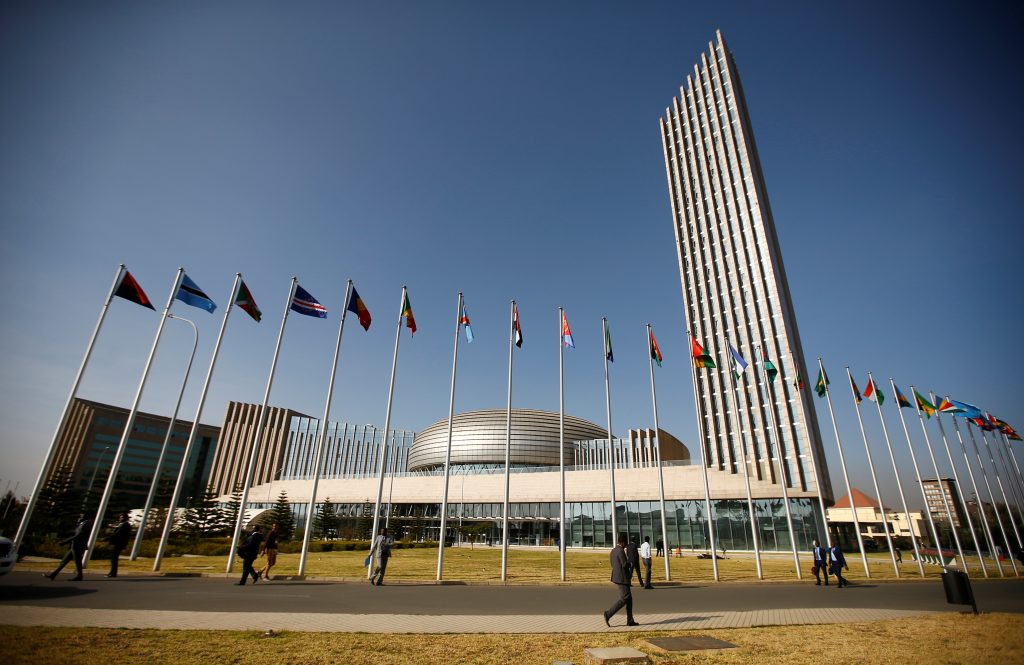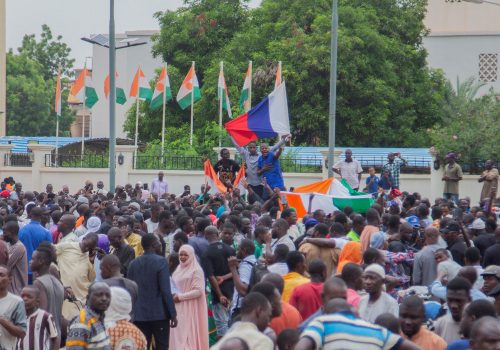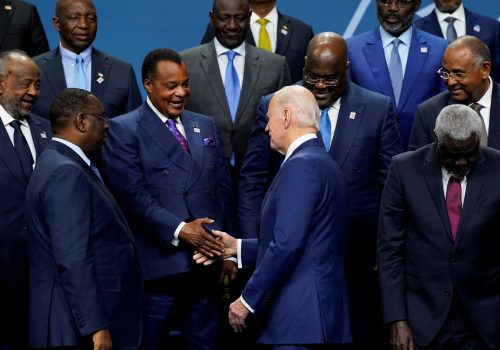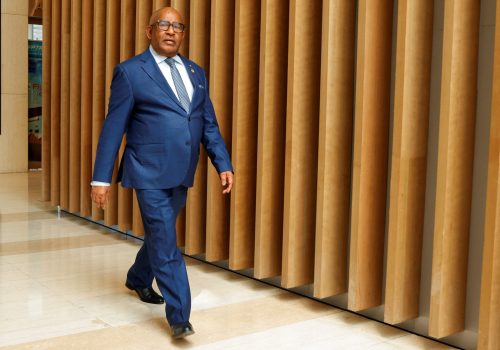By the end of 2024, the face of political Africa will—theoretically—no longer be the same. With nineteen elections scheduled this year, the continent will see presidents leave who were elected more than ten years ago (in Senegal and Ghana), uncertain civilian transitions (in Chad, Mali, and Burkina Faso), high-stakes elections (as in South Africa), and strongmen hanging on (in Tunisia and Rwanda). This volatility, combined with the continent experiencing a wave of coups d’état, makes many observers pessimistic about a decline of the democratic ideal.
This “democratic winter” is not unique to Africa. In the United States, according to Gallup, only 28 percent of Americans—a record low, fewer even than in the aftermath of the attack on the Capitol on January 6, 2021—are satisfied with the way their democratic system works. In France, two in five voters dream of an unelected strongman at the head of the country. It is not surprising that the value of democracy is also disputed in Africa, and that arguments against it take the form of claims to national sovereignty and are mainly directed against the former colonial powers. Wherever recent coups have taken place, the putschists have publicly rejected the influence of former colonial powers (as in the Sahel region with France) or Western institutions (as in Sudan, where General Abdel Fattah al-Burhan used the structural reforms inspired by the World Bank to justify his coup in October 2021). Coup leaders have accused the previous governments of having installed falsely democratic regimes, which they claim were weak and responsible for the persistence of underdevelopment. In Niger, President Mohamed Bazoum is still being held against his will, accused by a military junta of having had “exchanges” with “foreign heads of state” and “heads of international organizations.”
How has the concept of democracy, at least in terms of aspiration, become so divisive that its rejection is no longer even taboo? No international conference lacks African putschists who have not been elected by anyone claiming their legitimacy to take power by force with the cheers of their supporters. While some of the allegedly “spontaneous” demonstrations in the streets they refer to are organized, these events resonate deeply in African opinions, especially among the younger generations.
These are poor excuses, not to mention that there is something deeply insulting about suggesting that Africans do not deserve to choose their leaders and, therefore, to live freely. Besides, why should anyone believe that democracy is only a Western concept?
An African vision of democracy
The Manden Charter, proclaimed in 1222 at the time of the Mali Empire—centuries before the UK Bill of Rights—is considered in Africa to be the first declaration of human rights in history. The charter celebrated the preservation of life (Article 5: “Everybody has a right to life and to the preservation of physical integrity”) and organized coexistence between communities (Article 11: “When your wife or your child is missing, stop running after them in the neighbour’s house”). It also protected the rights of women (Article 14: “Never offend women, our mothers”; Article 16: “Women, apart from their everyday occupations, should be associated with all our managements”), foreigners (Article 24: “In Manden, do not maltreat the foreigners”), the homeless (Article 31: “We should help those who are in need”) and even the enemy in battle (Article 41: “You can kill the enemy, but not humiliate him”).
As we can see, Africans are very familiar with democratic practice, and that is true well beyond the Mali Empire. Among the Yoruba, the power of the chief was revocable. Among the Ashanti in Ghana, the village chief was chosen by the heads of families, who formed a council. An association of adults from each village represented public opinion and elected a president.
Today, there are plenty of examples of democratic successes in Africa. In its 2023 report, Freedom House wrote, “Freedom in Africa slightly advanced in 2022 with 11 countries seeing improvements in their political rights and civil liberties and 9 experiencing declines.” In Liberia in January 2024, Joseph Bokai peacefully succeeded George Weah, who had succeeded Africa’s first female president, Ellen Johnson Sirleaf, in January 2018. In Botswana, all elections since independence in 1966 have been conducted peacefully, in a multiparty institutional system where minorities are represented. Botswana has no curse around raw materials: Diamonds, which generate half of public revenues, ensure the prosperity of the country and the government finances the primary and secondary education of all students. From Mauritius to the Seychelles to Cabo Verde, African islands enjoy remarkable political stability. According to Freedom House, “Cabo Verde (receiving a total score of 92 on Freedom in the World’s 100-point scale), Mauritius (85), and São Tomé and Príncipe (84) have the highest aggregate scores in the region. All are rated Free.” Namibia is notable for having only three presidents since 1990. The third—Hage Geingob, who died in February 2024—was first elected in November 2014 in Africa’s first fully electronic elections. He succeeded Hifikepunye Pohamba, who respected the constitution and stepped down after two terms in office.
Ghana is one of the countries that has made progress in its democratic practice. Since the 1992 constitutional reform, Ghana has held eight free elections, while the current president, Nana Akufo-Addo, is preparing to leave power in December 2024 after two terms.
In Zambia, President Hakainde Hichilema took office in August 2021 following a smooth political transition with outgoing President Edgar Lungu, despite a longstanding rivalry between the two men. Hichilema was running for president for the sixth time, three of them against Lungu. This was the third time since 1991 that power passed to the opposition in Zambia.
In Tanzania, former President Ali Hassan Mwinyi, who introduced multiparty democracy and recently died at the age of ninety-eight, was called the “champion” of democracy in East Africa by US Vice President Kamala Harris during her March 2023 visit. Under his successor, Samia Suluhu Hassan—in office since April 2021 and one of two women leading African nations, a distinction she shares with Ethiopia’s Sahle-Work Zewde, who has been in office since 2018—Tanzania is fighting for a democratic practice that began with Julius Nyerere, the Mwalimu (“the Teacher”), the president of Tanzania from 1964 to 1985.
In Senegal, recent upheavals—including a February announcement, since rescinded, by President Macky Sall that he would delay the previously scheduled February 25 elections—have not derailed the institutional system. Sall and the National Assembly have complied with the decision of the top legal authority that set the date of the presidential election, confirming the exceptional democratic journey of Senegalese society. In sixty years, the country has had only four presidents, and each transition has taken place under the watchful eye of communities and institutions—including the army, which is known for its peacemaking role.
At the level of regional organizations, the Economic Community of West African States (ECOWAS) has been criticized by commentators for failing to prevent recent coups d’état in the region and for the withdrawals of Mali, Niger, and Burkina Faso from the organization. However, the majority of ECOWAS members have upheld democratic norms—including Guinea-Bissau and Liberia, which previously faced war and conflict. Notably, from 2015 to 2020, ECOWAS maintained peace and stability in the region, without any coups.
It is worth noting that while all these successful experiences are individually celebrated as exceptions, they represent a significant trend of African democratic successes. Out of fifty-four African countries, 17 percent are considered “free” by Freedom House and 37 percent are considered “partially free.” Added together, the majority of African nations (54 percent) are at least partially free. In comparison, of the twelve countries in the Eurasia region (the countries of the former Soviet Union), 67 percent are considered “unfree” and none are perceived as “free.” According to Freedom House, people live freer in Africa than in Eurasia thirty years after the fall of the Soviet Union.
Contrary to the popular belief that Africa is a land of inter-ethnic wars, the continent’s significant cultural diversity, far from being only a challenge, is one of the most original elements of African democratic systems. For example, Senegal was led for twenty years by a president who belonged to two minority groups, Serers and Catholics, in a country that is predominantly Wolof and Muslim. With more than three thousand languages spoken and multiethnic cultural challenges, African political models have no equivalent elsewhere in the world.
Africa’s history is full of experiences of multicultural governance. In the Mali Empire, diverse ethnic peoples—Tuareg, Wolof, Malinke, Bamba, Fulani, and Toucouleur—lived together, and a religious tolerance prevailed in which no Malian king waged a holy war (jihad). The Ghana Empire, which covered a large area from Tekrour to Awdaghost, included populations as diverse as the Bambara, Toucouleur, Wolof, and Serer. While the emperor practiced animist religion, he showed tolerance toward Muslims and chose most of his ministers from among them, as recalled by the Burkinabe historian Joseph Ki-Zerbo.
There’s no conflict between democracy and sovereignty
But if the arguments against democracy made by coup leaders and their supporters hit the nail on the head, it is because modern democratic practice, far from this African heritage, has disappointed them. First, the colonial period resulted in the destruction of traditional African participatory structures such as “acephalous societies, centralized kingdoms, elective theocracies, independent city-states, and oligarchic republics,” as researchers Fanny Pigeaud and Ndongo Samba Sylla reported in a January 2024 book. Democracy in Africa was then the collateral victim of geopolitical rivalries, as ordinary men who sought power in the aftermath of independence—such as Patrice Lumumba in the Democratic Republic of the Congo, Samora Machel in Mozambique, and Amilcar Cabral in Guinea-Bissau—were killed during or after running for office. Secondly, security was prioritized over democracy in countries where jihadist danger needed to be contained. In several cases, containing such danger has been a convenient excuse to muzzle dissidents, and to dodge or even rig elections. In the 1990s, the democratic opening was able to sweep away old leaders—such as the first president of Zambia, defeated in 1991 after twenty-seven years in power, or the first president of Malawi, Hastings Kamuzu Banda, defeated in 1994 after thirty years—but family and military transitions are a widely shared reality in Africa. The most successful democratic experiences have been akin to national liberation struggles and have come at a high price, as symbolized by South Africa, where the story of former President Nelson Mandela demonstrates the harshness of the democratic struggle.
Undoubtedly, these hardships have created a “democratic fatigue” that has been reinforced by the persistence of underdevelopment in countries richly endowed by nature.
The restoration of the democratic ideal requires going far beyond simple rankings with points awarded according to indicators of freedoms or rights. It also requires doing better than the use of election-observation missions in Africa. Although there are numerous such missions (including those by the African Union, International Organisation de la Francophonie, European Union, ECOWAS, foundations, and nongovernmental organizations), and they are governed by the Declaration of Principles for International Election Observation (2005), the Code of Conduct for International Election Observers (2007), and the Declaration of International Principles for the Impartial Observation and Monitoring of Elections by Citizens’ Organizations (2012), election-observation missions are often perceived as illegitimate because they are externally funded and, in some cases, do not prevent protests or violence. Moreover, missions can fail for security reasons, such as when the European Union withdrew from the Democratic Republic of the Congo in November 2023. Solutions to restore the luster of these missions have been widely documented, including greater integration of in-country residents, improvement of civil-status registers, better distribution and security of polling stations, and national financing of electoral missions.
But in an ideal situation, Africa would still be able to do without such solutions. Democracy is bigger than any one election. No matter how perfectly organized an election is, if the turnout is low, if the political parties competing are on the same side, if the conditions for competition are biased, if citizens are not educated or informed about the stakes, or if there is no possible appeal, a country is still falling short of the democratic ideal. These things are matters of education policy, civic training, and strong institutions, and often escape international observation missions and rankings.
With its population expected to double in the next twenty-five years, and a generation emerging with the ambition of making its voice heard, Africa holds much of global democracy’s future in its hands. The youth of Africa are fiercely committed to public affairs. There is a clear gap between the young Africans, including movements such as Le Balai Citoyen and Lucha, who are chasing away authoritarian regimes, and those who applaud the Sahelian putschists. Young Africans are united by their desire for stronger national sovereignty. To regain value in the eyes of the people, the African version of democracy will not only have to renew some of their leaders (the new forty-year-old leaders of West Africa contrast with the advanced age of African leaders) but also embody their aspiration for sovereignty and a regained dignity. Neither Washington nor Beijing can bring this to Africans. As for the Westerners who want to reconnect with this old continent with such a young population, it is important that they do not practice the double standards, and instead apply to Africa the level of democratic demands they have for their own citizens. This is a competitive advantage they have over the Russians and the Chinese. This path holds great promise, as it is not certain that African youth—more educated and attached to their freedom of expression—would let Russia and China drag them onto the authoritarian path they promote.
African leaders must understand that democracy, far from being a simple electoral operation, is first and foremost an act of patriotism. That is why it is fundamental to teach the democratic history of Africa, so that democracy and national sovereignty on the continent no longer clash. It is also essential to strengthen civic education, starting in elementary school. In the political arena, the strengthening of institutions is crucial, including the administrations, federal institutions and services, and checks and balances such as the judiciary and media. It will also be necessary to reform institutions so that they better reflect African realities, including better representation of elders, strengthening of local governance, and inclusion of youth associations. Finally, it is crucial that the opponents—often weakened by years or even decades of opposition, exile, or prison—be equal to their heavy task. While men in fatigues are in vogue today, we can bet that this will not always be the case, and it will then be necessary for visionary patriots to be ready to take over.
About the author
Ambassador Rama Yade is senior director of the Atlantic Council’s Africa Center and senior fellow for the Europe Center. She is also a professor of African affairs at Mohammed VI Polytechnic University in Morocco and at Sciences Po Paris.
She is a Senegalese and French citizen.
Prior to joining the Council, she was a consultant for the World Bank. She also has strong experience in the private sector as an editor in London and as director for development at a French consulting firm in corporate and social responsibility.
Yade has over a decade of experience working in French, European, and international politics. At the age of thirty, she was appointed as the deputy minister for foreign affairs and human rights of the Republic of France: the first ever French minister for human rights and the first woman of African descent to become a member of the French cabinet. In recognition of her work, she was Nelson Mandela’s personal guest on his ninetieth birthday in Johannesburg. At that time she was also recognized as Young Leader by the World Economic Forum.
She was subsequently appointed to the position of deputy minister of sports. Yade was also appointed as the ambassador of France to UNESCO. She started her professional career as a parliamentary high civil servant at the French Senate and director of communications of the TV network of the Parliament.
Related content
Image: A general view shows the headquarters of the African Union (AU) building in Ethiopia's capital Addis Ababa, January 29, 2017. REUTERS/Tiksa Negeri



